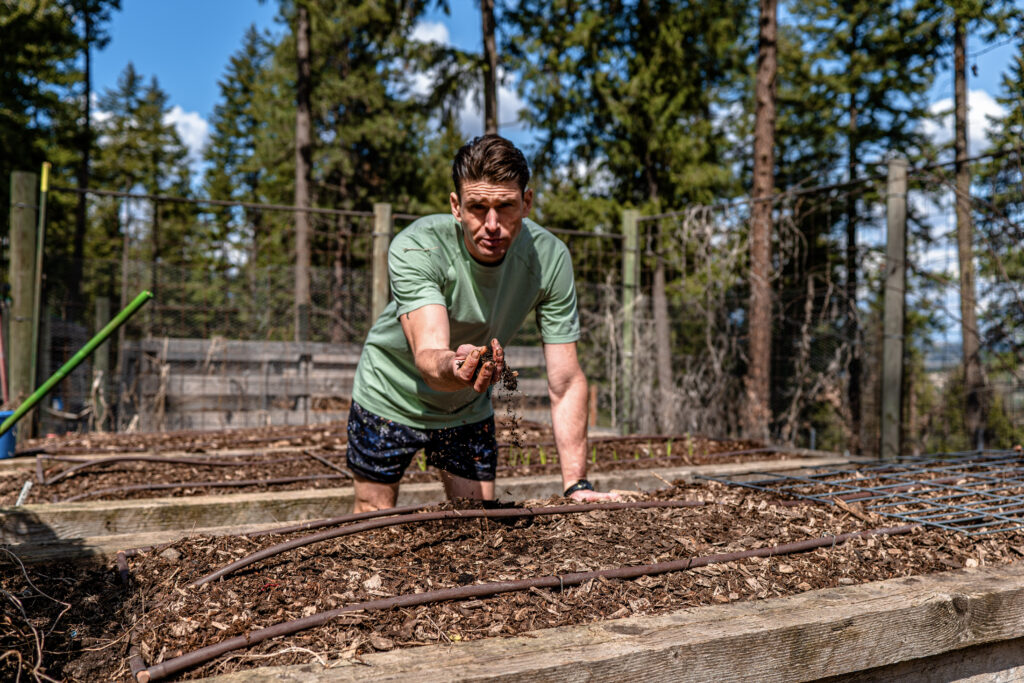March 13, 2022
When I grow up, I kinda want to be that slightly grumpy, radically honest, wrinkled-up old man who doesn't seem to give a crap about what people think of him. Not in a selfish, arse-holy kind of way, mind you, but rather in a fully authentic and transparent manner—an old man rooted in my beliefs and values, not acting like who I think the world wants me to be, but who I truly am at my core.
You know…
…I want to be the old man who saunters up to the bar, slams his fist down, smiles confidently, and politely requests an Old Fashioned, on the rocks, not a rock, thank-you-very-much…
…the old man who tells a bunch of young whipper-snappers huddled in the garage next door with their VR headsets playing Zombie Golf Pro XT96 that they should probably be outside in the sunshine, playing actual golf…
…the old man who winks at his wife when she asks him if this dress makes her look fat and quips yes, darling, that dress does make you look fat and I love you anyway.
Of course, being authentic, strong, brave, bold, boundless, and confident as you age is also a strategy rife with risk, because it requires you to have held on to some significant semblance of your ego.
After all, it's easy to think that when you’re old you won’t really care so much about yourself or what people think of you, and you really won't let what you think the world thinks of you dictate what you decide to do or how you decide to carry yourself. It's also easy to convince yourself that you'll have developed so much humility when you get older that you'll easily be able to set aside any shreds of egotism or pride that might dictate you actually do care what people think. It's easy to think that when you're eighty years old, standing in your closet, pulling on your pants, you won't be wondering if they're the “cool pants” all the other eighty-year-olds are wearing these days.
But don't fool yourself.
Your ego—that current state of consciousness formed through years of mental conditioning, thoughts, and emotions that largely dictate how you see and how you act in the world—isn't going to somehow magically disappear when you turn eighty. There isn't going to be a random Tuesday in the year 2043 at 6:17 am when you sit up and say, “Hey, I don't care what people think about me anymore! I think I'm just gonna be me from here on out!”
Nope, you will still be looking at a group photo someone snapped at a party and find yourself desperately scanning for your own face to make sure you look OK, that your eyes are actually open, and that you're not doing that one weird smile that makes you cringe.
You will still wake up with a mind racing with all the tasks that you need to check off for the day so that you can pat yourself on the back for being a productive and impactful member of society, and it's likely that all those tasks that have piled up will still also stress you out just as much as they do now. After all, do you really think that there's a special time, after your hair has turned grey, that 307 e-mails in your inbox are going to stop bothering you and your do-do-do mind?
You will still find yourself offended or upset by what people do or do not say about you or how they treat you, including your grandson who seems more interested in his smartphone than your story; your cousin who didn't invite you to her birthday party, again; your neighbor's garbage can that keeps tipping over and spreading plastic bags into your perfectly manicured front lawn; and the waitress who gave you a hard time for asking her to substitute mushrooms for the mashed potatoes.
So you know what?
You better learn to manage your ego now because it's not going anywhere anytime soon.
Why You Should Kill (Or At Least, Shrink) Your Ego
If you want to keep yourself wide open to new opportunities, have meaningful conversations, build better relationships, innovate, create real value and impact in the world, engage with greater empathy, and set aside the hubristic tendencies I describe here, then I can guarantee you that your ego—that portion of the human personality which is experienced as “self” or “I” and that part of you that remembers, evaluates, plans, and is responsive to and acts in the surrounding physical and social world—is going to get in the way, especially if it's an over-inflated ego.
Why do I say this?
Because an inflated ego can either root you in 1) superiority, which keeps you clutching your own opinions and beliefs while remaining somewhat close-minded to others' opinions and beliefs, or 2) inferiority, which keeps you clutching at safety and control and never stepping outside your comfort zone enough to expand as a human being or make maximum impact with your life.
If your ego is steering the ship of your life, you'll be far less prone to put yourself into situations that challenge you (and your ego), and subsequently miss out on new experiences and opportunities to grow.
You'll have a harder time engaging in difficult conversations that could help you build better relationships.
You'll fail to truly connect with people and thus miss the opportunity to learn from others, solve problems more efficiently, and ultimately become a better human.
You'll play it safe out of fear of looking foolish, being embarrassed, or admitting when you don't know the answer or don't know how to do something.
You'll have a difficult time empathizing and seeing things from other people's perspectives, holding you back from innovation and the objective viewpoints that open you up to seeing your blind spots through the lens of your fellow humans.
You'll listen less.
Be present less.
Care less.
Be unselfish less.
You'll find yourself clutching at all the elements of control and OCD-like tendencies that I describe here (read that please!), and that I had to personally struggle with for oh-so-long until I finally accepted that I could release control, set aside my hero complex, and realize that I wasn't some special, unique, snow-flakey “God's gift” to all of humankind.
10 Quick Tips For Managing Your Ego
Now, don't get me wrong: I'm not one of those guys who think you need to visit a fancy ketamine clinic or meander down to Peru and suck down oodles of Ayahuasca in some kind of shamanistic attempt to “kill your ego.” The mere fact that most of the people who attempt that kind of quick “drug” fix wind up going back half a dozen or more times to try to “finish the job” is pretty strong evidence that it probably doesn't work.
Sure, the right plant medicine approach combined with some serious, systematic, and thorough post-journey integration may help, but I definitely don't want to be the guy who tells you some quick drug or plant or biohack will help you manage your ego. Strategies like that can certainly fast-track the process when administered properly, but, frankly, most people don't “do the work” afterward. It's kind of the equivalent of buying a nice piece of exercise equipment, but not actually using it. We humans are inherently lazy, and there's no magic plant or herb or supplement or drug that is going to “kill your ego” effectively. I've personally undergone a 27 hour long, unforgettably horrific near-death, ego-killing experience with plant medicines (an experience I wouldn't wish upon my worst enemy), and yet still have to wake up daily, humble myself before God, and go deep into prayer, journaling, meditation, worship, and breathwork to manage my own ego.
So how do you develop a healthy relationship with your ego, and ensure it doesn't get too big for its britches?
I'll leave you with a few quick tips that I've personally found quite helpful (and trust me, I'm hardwired via both nature and nurture to be about one of the most egotistical, narcissistic, selfish dudes on the face of the planet). Follow the links below to read more comprehensive articles or listen to podcasts on any of these tactics.
Tip 1: Practice Presence
Be here now. Train yourself to stop constantly thinking ahead, dwelling upon what you're “going to do next,” or constantly multi-tasking. If you try nothing else, my very best tip for you for maintaining presence is to begin to listen for the “silence between the notes” in every song you hear and every podcast or audiobook you listen to, then apply the same presence necessary to identify that silence to your conversations, your meals, your reading, your prayers, everything. Listening to the silence between the notes is your training ground, and it will build your presence muscles surprisingly fast.
Tip 2: Serve Others
Engage in acts of service that put you in a non-entitled state outside your comfort zone and allow you to see other humans in uncomfortable scenarios. When you put yourself in this state, do your best to help them. You can't help people unless you go be places where people who need you are. Read that last sentence again, please.
Tip 3: Meditate and/or Practice Breathwork
Meditate and/or do breathwork daily, so that you are forced to “sit with” and “observe” your self and the thoughts that spill into your mind about you and the world when you simply sit in silence or with your breath. You can learn more about breathwork in my articles on SOMA Breath and other breathing techniques, as well as my podcasts with James Nestor and Niraj Naik. For more resources on meditation, check out this article on the health benefits of meditation and this one on biohacking meditation, and this podcast episode with Emily Fletcher. Also my favorite breathwork app, bar none, is Othership.
Tip 4: Forgive
Make amends with and forgive everyone in your life for which you have any issues that may lead to conscious or subconscious anger, bitterness, or shame. As the sage Biblical saying goes, “Don't let the sun set on your anger.” Ever. Make restitution, and if that's literally impossible because you have no way in hell of ever finding that person again, then at least make peace with God about the situation by asking Him to forgive you, and if necessary, the other person.
Tip 5: Study the Apostle Paul
Paul is a perfect example of humility in action. Although he was perhaps the greatest advocate of Christ there ever was, he still considered himself the “least of the apostles” and the worst of sinners (1 Corinthians 15:9; 1 Timothy 1:15). He encouraged those who followed Christ to emulate Jesus’ humility, encouraging them to “do nothing out of selfish ambition or vain conceit, but in humility consider others better than yourselves”, noting that we should not simply look to our own interests, but also to the interests of others (Philippians 2: 3-4; Romans 12:10).
Tip 6: Learn from Jesus Christ
Read the teachings of Jesus Christ, particularly his Sermon on the Mount. Jesus is a beautiful example of humility (Mark 10:45; Philippians 2:5-8). “Take my yoke upon you and learn from me, for I am gentle and humble in heart, and you will find rest for your souls.” (Matthew 11:29). Jesus did not come to earth to be served, but to serve, making “himself nothing, taking the very nature of a servant” (Philippians 2:7). You can see an expression of Christ’s selfless attitude in the Garden of Gethsemane, when he said to his Father in heaven, “Yet not as I will, but as you will”(Matthew 26:39), and then on the following day when He humbly endured the tortures of the cross so that we could be reconciled to our Father in heaven.
Tip 7: Release All Attachments
Release all attachments in your life. Your body. Your biohacks. Money. Drugs and supplements and microdoses. Food. Knowledge. Podcasts. Books. The social media feed and direct messages check-in. Release it all. Go a few days without any of these that you choose, and if you go nuts (e.g. having a hard time lasting until noon without a meal, or a cigarette, or a square of nicotine gum), then ask yourself why. As Anthony De Mello says in his book Awareness: “I really do not need you to be happy. I’m only deluding myself in the belief that without you I will not be happy. But I really don’t need you for my happiness; I can be happy without you. You are not my happiness, you are not my joy.”
Tip 8: Study Humility
The opposite of ego is humility, and both the Old and New Testaments are laden with references to living in humility. The book of Micah read, “What does the LORD require of you? To act justly and to love mercy and to walk humbly with your God” (Micah 6:8). King Solomon declared, “Humility and the fear of the LORD bring wealth and honor and life” (Proverbs 22:4). One verse that perfectly illustrates why we are to be humble is Peter’s exhortation in his first epistle: “All of you, clothe yourselves with humility toward one another, because, God opposes the proud but gives grace to the humble.” (1 Peter 5:5).
Tip 9: Create Beautiful Things
Understand that—being made in the image of God—you'll always have a conscious or subconscious desire to be like God or be a god. That was the very first mistake we humans ever made when we ate of the tree of the knowledge of good and evil in our attempt to usurp God's power over our lives (read more about that here). But rather than trying to be God or be a god, instead consider that by engaging in acts of beautiful creation, using the unique skills and talents that only you were born with, you can worship God and scratch that itch to create like God created, without actually attempting to be a deity yourself, which is the ultimate definition of an overinflated ego. So go build a cabinet, paint a watercolor portrait, write a song, play piano, begin a poem, plant a garden, and start or grow a family. Creation does a magical job at hacking away at a big ego, especially if you thank God with great gratitude each day for the talents he has blessed you with, and for your ability to create and dedicate your creations to Him.4
Tip 10: Practice Gratitude
Of course, that leads me to my last point: be grateful. Write in a gratitude journal every day. Here's how I do it and why.
My new book Endure would probably help you out a bit, too. I highly recommend (in full humility, of course) that you read it. It details plenty of my own ego-driven personal struggles, trials, and temptations, how I overcame those, and how you can too. It's the kind of stuff that will keep you from being an arrogant, egotistical old man or woman, and instead to be the humble, loving, kind Grandma or Grandpa with those twinkling eyes, authentic smiles, and engaging, approachable personality that will fill your life with greater love, relationships, and happiness.
And yeah, you can still have a healthy, well-managed ego that allows you to order that drink at the bar just the exact way you like it, but perhaps with the open-mindedness to take the bartender up on their offer for a sprig of thyme, and on one big rock, rather than the rocks. Who knows? You might actually like it, and you might actually grow as a person until the very day you die if you continue to work on your ego each day.
Now I'd love to hear from you. How do you manage your ego? What steps—from prayer to meditation to self-examination to service to loving your neighbor to turning the control reigns of your life over to God —do you currently use to keep your ego in check? I'd love to hear from you. Leave your questions, comments, and feedback below. I read them all.














I wanted to share. It happens to be the second most bought book in the history of the world. The Imitation of Christ book has changed my life so much. It really covers ego so well and how to be humble.
I recently relocated after retirement and due to the housing market bought a home and property that needs updating. It actually pains me to have a home that is unfinished. You never know when ego will rear its ugly head.
I have a lovely, winter mountain view with rolling hills yet the focus is on what I don’t have instead of gratitude for what I do have. Being in the present moment to appreciate and use our God given skills to work hard and create the home my husband and I will enjoy living in instead of worrying about what others will think when they come to visit will bring the peace of mind and heart needed to enjoy our new life.
Thank you for this article. It was what I needed to read today.
Thank you for this!
Brother, we love you and thank you.
This is great article Ben!
A great movie to watch that is complimentary to this article is the movie “Revolver”. If you don’t watch movies ever or often consider this one an exception. I was too young to fully appreciate it when it first came out but watching it again a few years ago it blew me away! I had to immediately watch it again, it is one of those movies where “nothing is as it appears”. A full metaphorical journey, something that really increased my appreciation for Guy Ritchie. I don’t want to give it away, the less you know about the movie the more incredible it will be, definitely an experience and a reminder that I like to return to every now and again, so many symbolisms in it.
Good lord. That was fantastic.
I thought you were physical health only. Great job!
Hi Ben,
Great article! I have been implementing a few strategies you recommended in this article and from your Fit Soul book. The continual practice of being Present has really helped and breathe work has been great when I need to recenter. One of the best practices In my opinion is starting my morning with spiritual disciplines and committing more time to prayer. Nothing beats that for diminishing ego, building humility and filling yourself with the Holy Spirit. Thank you for all the great information you continue provide, it has truly helped and continues to help me become the best version of myself! Hope you and your family have a blessed Sunday.